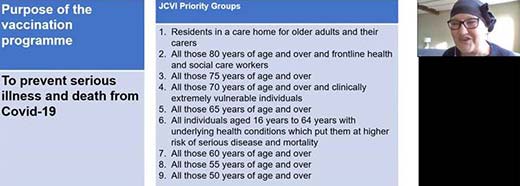Thursday, 18 February 2021
 Vaccines and Vaccination in Calderdale
Vaccines and Vaccination in Calderdale
Speaker: Director of Public Health for Calderdale, Deborah Harkins
Over 100 members of the Todmorden U3A attended a Zoom talk in early February by the Director of Public Health for Calderdale, Deborah Harkins.
She explained that the purpose of the vaccination programme is not just to reduce the spread of the disease and the need for lockdown restrictions, but principally to prevent serious illness and death as a result of Covid-19 infection.
Nine priority groups

Whilst describing the NHS' nine priority groups, Debbie pointed out that 95% of those who had died from Covid-19 to date were from groups 1 to 4, so by vaccinating these groups first, we can maximise the ability of the programme to protect the most vulnerable people from serious and critical illness.
How many vaccinations are required to save one life?
The effectiveness of the vaccination programme was looked at in terms of how many vaccinations are required to save one life. In category one, residents in care homes, 20 vaccines are needed to save one life, while in category two, all those aged over 80, it requires 160 vaccines to save one life. Going down the list, the number of vaccines ultimately grows into several thousands to save one life, but it is this widespread immunity that will allow us to resume normal living again.

Roaming vaccination teams
Most of the audience were aware of the various ways that the vaccination can be obtained - in primary care centres, like Calderdale Royal, to community practices, pharmacies and mass vaccination sites. There was some surprise about the roaming vaccination teams, that will literally go to the homes of the most vulnerable and those who are physically unable to get out to the different vaccination locations.
Before taking questions, Debbie covered areas such as the pattern of uptake, and the fact that there are scams out there supposedly offering vaccinations for money. It is a complex question as to why people, some even in a care home setting, refuse the vaccine.
Concerns about the efficacy of the vaccine
Some people are concerned about the efficacy of the vaccine, or they are vaccine hesitant and wish to see how it manifests itself in the population, as well as some thinking that the vaccine has been developed far too quickly to be really effective. There may be cultural concerns regarding the contents of the vaccine, although the main faith groups have supported it.
Structural inequalities in the system that may have let people down over the generations may breed cynicism and suspicion towards such an initiative.
Debbie took the view that persuasion and understanding are the best ways to encourage people in taking up the vaccine as a more mandatory approach could stimulate further suspicion and conspiracy theories.
Questions
In a robust question time, members probed future vaccination strategy in Calderdale, with the first query about how quickly the vaccine will be given to the under 70s. Told that such invitations were imminent, we were reminded that this is a complex programme and there are limiting factors that affect the rate of vaccinations, such as the availability of vaccines, the population of the people in the different groups and of course the uptake – which is very good overall in Calderdale.
Test and Trace
Asked about the effectiveness of Test and Trace in Calderdale, Debbie told of how Calderdale was pretty much first to develop an effective local contact tracing service and how have been able to work very successfully in tandem with the national scheme to contact practically everybody they are informed about, down to knocking on doors.
As to the future, Debbie felt that until the whole world population has been vaccinated, we will continue to get new variants, possibly requiring a new vaccination every year, eventually ending up like the flu vaccine, as given annually to vulnerable groups.
'Do not lower your guard'
Debbie's final message to all, including those who had been vaccinated, was 'do not lower your guard'.
The next Todmorden U3A Monthly Members Meeting by Zoom will be on Thursday 18th March 2021 at 1.45 p.m., open to all fully paid-up members.
Our presenter for March will be Georgina Ferry with a talk entitled, 'From Diamonds to DNA'.
Not yet a member? You can attend one talk free by requesting an invitation to this zoom event. We're always delighted to welcome new members.
Our contact details are www.u3atod.org.uk (website), info@u3atod.org.uk (email), or 01422 886021 (phone).
Many thanks to Michael Astrop for this report
Previous U3A reports on the HebWeb - click here

